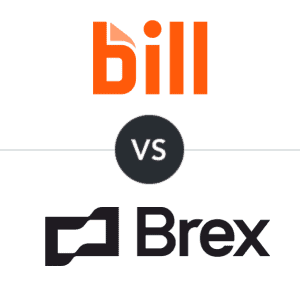Ramp and BILL Spend & Expense both have no fees, generous rewards, and features that small businesses appreciate. Which one is a better fit for your business?
Ramp and BILL Spend & Expense both advertise no fees, generous rewards, and useful features, earning each a place on our list of best corporate credit cards for businesses. With so much in common, how do you decide which option is better for businesses?
This head-to-head Ramp versus BILL Spend & Expense comparison will help you decide which corporate card is right for your business.
|
Ramp |
BILL Spend & Expense |
| Rewards |
- Up to 1.5% cashback on everything
- Up to $350,000+ in partner discounts and deals
|
- Up to 7x on restaurants
- Up to 5x on hotels
- Up to 2x on recurring software
- Up to 1.5x on everything else
|
| Annual Fee |
$0 |
$0 |
| Set-up Fee |
$0 |
$0 |
| Late Fee |
$0 |
2.99% or $38, whichever is greater |
| Cash Reserves Required |
$25,000 |
$20,000 |
Ramp VS BILL Spend & Expense At A Glance
Both Ramp and BILL Spend & Expense have no monthly fees, extensive expense management, card controls, and more.
The main differences between Ramp and BILL Spend & Expense are the rewards structures (Ramp offers flat cash-back while BILL has custom rewards earning categories), foreign transaction fees (Ramp has none whereas BILL does), and the eligibility requirements (Ramp requires cash reserves of $25,000, while BILL only requires $20,000 and accepts sole proprietors as well)
Ready for some nitty-gritty details about where each card shines and falls short? Let’s dive into the biggest takeaways between Ramp and BILL Spend & Expense.
Where Ramp Wins
- Simple rewards scheme with up to 1.5% cashback
- $350,000+ in partner discounts
- No credit check (whereas BILL Spend & Expense does a soft credit pull)
- Unique cost-cutting automations
- No foreign transaction fees
- No late fees
- One-click out-of-pocket reimbursements
- Visa fraud protection
- Slack integration that supports reimbursement requests
- HR integrations
Where Ramp Falls Short
- $25,000 cash reserves required to qualify (as opposed to BILL’s $20,000)
- Available only to US-based non-individual liability corporations
- No phone support
- Low credit limits
Where BILL Spend & Expense Wins
- Flexible rewards categories with up to 7x rewards points possible
- Strong budgeting features
- Only $20,000 cash reserves required to qualify
- Sole proprietorships can qualify as well (whereas Ramp is only available to corporations)
- Credit Builder program
- Telephone support (Ramp has no phone support which is a big complaint from their customers)
Where BILL Falls Short
- Rewards don’t kick in until after a year of card use
- BILL charges foreign transaction & late payment fees
- Personal credit check with soft pull required
- Customers report that accounting integrations can be buggy
Ramp VS BILL Pricing & Fees Compared
One of the best things about using the Ramp corporate card is that it’s completely free. You won’t find any common card fees — that means no setup fees, late fees, interest fees, annual fees, foreign transaction fees, or employee card fees. You’ll also pay no monthly fee to use Ramp’s expense management software and spend controls.
BILL comes close to matching that but slightly misses the mark. With BILL Spend & Expense, you won’t pay any upfront fees, such as account setup, annual fees, or employee card fees. However, there is a cross-border fee of 0.90% of total transaction volume when the account user is US-based; 0.20% when the account is Canada-based, a currency conversion fee of 0.20% of total transaction volume, and a late payment fee of 2.99% or $38, whichever is greater. While we don’t like seeing foreign transaction fees, this one is still quite a bit cheaper than some of the alternatives out there.
Overall, Ramp is cheaper than BILL. However, some businesses can still use BILL Spend & Expense without encountering fees if they don’t do international business and avoid late fees.
Ramp VS BILL Rewards & Features Compared
| Available Services |
Ramp |
BILL Spend & Expense |
| Corporate Cards |
|
|
| Cash Management Account |
|
|
| Expense Management |
|
|
| Bill Pay |
|
|
| Accounting Automation |
|
|
| Spend Control |
|
|
| Instant Revenue |
|
|
Ramp and BILL both include strong expense management and spend controls. The main difference in terms of features is that Ramp has a bigger focus on savings automation, while BILL Spend & Expense has a bigger focus on expense automation and employee card controls.
Here are some other ways the two corporate cards differ when it comes to features.
Only Ramp Offers
- Up to a 1.5% cash-back rate
- Unique savings automations
- Slack bot integration that lets users request, review, and issue reimbursements within the app
- Employees can submit spend requests via email or SMS
Only BILL Spend & Expense Offers
- A spending category points reward structure
- Unique budgeting features
- Receipt capture for expense reimbursements
- The ability to receive notifications when employees spend using their BILL card, so you can easily review, approve, and sync transactions
- Automatic expense categorization & expense reports
- Credit builder program that includes a line of credit
If you’d like to see a complete breakdown of these features, visit our website to check out our complete Ramp card review and our BILL Spend & Expense card review for more details.
Ramp VS BILL Spend & Expense Eligibility Requirements Compared
| Eligibility Requirements |
Ramp |
BILL Spend & Expense |
| Personal Guarantee |
|
|
| Credit Score |
N/A |
Good to Excellent personal credit |
| Minimum Bank Balance |
$25,000 |
$20,000 |
| Business Structure |
Corporations and LLCs |
Sole proprietors, corporations, and LLCs |
You’ll find clear differences between Ramp vs. BILL when it comes to who is eligible to use these corporate cards. One difference is that Ramp offers full transparency about its eligibility requirements, whereas BILL does not disclose its requirements fully. Here is a quick breakdown of what we know about each corporate card’s requirements.
Ramp is available only to businesses formed as corporations and LLCs and registered in the US. Nonprofits are allowed, but individuals, sole proprietors, and unregistered businesses are not eligible for Ramp’s corporate card. Ramp requires businesses to have $25,000 in a US bank account. Ramp will judge your eligibility and credit limit based on your company’s cash balance, cash flows, and other indicators of financial health.
BILL Spend & Expense is open to a wider variety of business types than Ramp, requiring only a US bank account and US EIN. BILL says that its card is suitable for small to mid-sized businesses but does not list specifically what types and sizes of businesses it accepts. However, BILL Spend & Expense told Merchant Maverick that sole proprietors are eligible to apply, so long as at least one owner with a minimum 25% ownership stake is a US citizen or resident. Applicants should have good or very good personal credit, and businesses that are approved typically will have at least $20,000 cash in an active account.
Which Is Better For My Business: A Ramp Or BILL Spend & Expense Card?
Ramp and BILL both have a lot to offer to businesses seeking corporate cards with few fees, useful integrations, robust features, and generous rewards. If you’re still stuck trying to choose between using BILL corporate card or Ramp, here are our suggestions.
Ramp has strict eligibility requirements that mean it might not be appropriate for every business. If your business is not a corporation, and if you don’t have at least $25,000 in cash reserves, your business is not eligible to use Ramp, and BILL Spend & Expense will be a better choice. BILL is available to businesses that are not formed as corporations, and you won’t need to meet high cash-on-hand requirements.
And, while BILL has significantly higher reward rates than Ramp, you’ll have to work to earn them. BILL Spend & Expense won’t deliver any rewards for the first year of card use, and after that, you’ll need to pay off your card balance weekly if you want to hit the highest rewards tier. Rewards also depend on the category of your purchases, with restaurants and hotels earning at the highest rates.
So, while Ramp’s cashback rate may not seem to shine compared to BILL’s highest rate of 7x points, Ramp delivers that return on every purchase, in every category, and every time you use your card, which could make Ramp the better choice based on your business’s spending habits.
Here are more instances where one card outshines the other.
Choose Ramp If …
- Your businesses that do significant work outside the US and want to avoid foreign transaction fees
- Your company is classified as a corporation
- You want a simple cashback rewards plan without having to worry about purchase categories & repayment terms
- You can benefit from Ramp’s numerous and valuable partner discounts
- You want to apply for a corporate credit card without undergoing a personal credit check
Choose BILL If …
- Your business’s spending habits line up with BILL Spend & Expense’s earning categories
- You want to potential for much higher rewards rates based on how you use your card
- You don’t mind paying off your card balance frequently to unlock higher rewards
- You want some of the most flexible eligibility requirements possible for a corporate card with support for sole proprietors and the lowest cash on hand requirements we’ve seen
- You value telephone support
- You have strong personal and business credit and don’t mind a soft check on your credit as part of the application process
- You don’t mind waiting one year to access rewards
Keep in mind that you have many options when you’re looking for a corporate card, and while Ramp and BILL are both solid choices, you may do better with another card.
Check out our list of the best business credit cards for more options. We suggest taking a careful look at one competitor in particular, Brex, and we’ve made it easy for you to compare BILL Spend & Expense vs Brex and Ramp VS Brex. You can also look at our list of the best BILL Spend & Expense alternatives for more options to consider.
Whatever card you choose, you can improve your chances of being approved for a corporate card by checking out our tips on how to get a corporate card.














